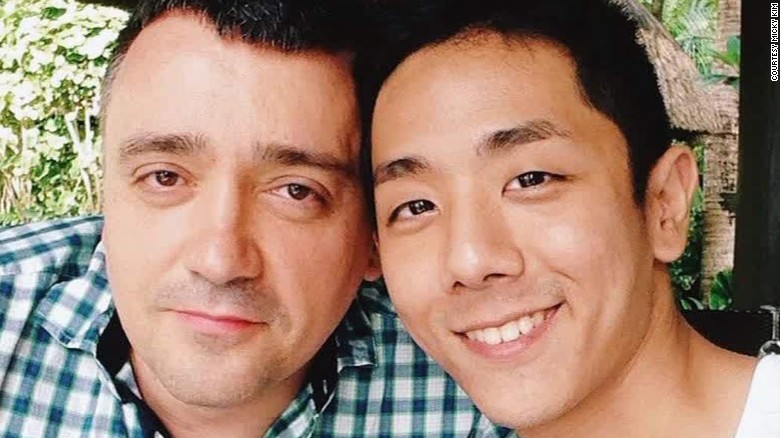South Korea is Our Ally, Defacto Part of NATO Yet The Homophobia There Is Equal to Ours in 1960
 |
| Being LGBT in South Korea can make for a difficult life. CNN's Kathy Novak tells the story of one gay couple living in Seoul and the challenges they face.
Images may be subject to copyright. Learn More
|
On a brightly lit stage, two male K-pop stars with glowing skin and perfectly coiffed hair are nibbling either end of the same long, chocolate stick.
As the stick gets smaller and smaller, they get closer and closer -- and eventually, a fellow K-pop idol pulls them into a kiss.
In South Korea's glitzy, highly manufactured music industry, these kinds of scenes are not uncommon. As long as it's only for show, that is.
Homophobia is still rife in South Korea, where very few mainstream music stars have come out as gay. The country has no comprehensive anti-discrimination laws to protect LGBTQ South Koreans and compared to nearby democracies like Japan and Taiwan, the country is less accepting of same-sex couples. (CNN)
By DA-SOL GOH
In Seoul, many people enjoy the annual Queer Culture Festival, regardless of their sexual orientation. Started with only 50 people in 2000, nearly 150,000 people enjoyed the festival last year, which marked its 20th anniversary. During the festival, participants urge the government to improve LGBT (lesbian, gay, bisexual and transgender) rights.
While many people hold rainbow flags during the festival, some Christian groups stage anti-LGBT demonstrations. They hang banners declaring that homosexuality is sin, same-sex unions would spread AIDS across the country, and gay unions would create chaos in Korean society. Christians, however, are not the only people who oppose the LGBT community in South Korea. A recent controversy over a transgender soldier suggests that many Koreans are still hostile to gender minorities.
Last week, Byun Hui-su, a transgender tank driver, drew public attention after she was discharged from the Republic of Korea Army after undergoing sex-reassignment surgery. While South Korea bans transgenders from joining the army, it doesn’t have any rule about soldiers who had a sex-reassignment operation while already serving. And until the Byun case, no one in the military had ever changed his or her sex while serving, so this case was unprecedented, and it became headline news.
Byun said she wanted to serve as a female soldier, but army officials ignored her plea. The army explained that it decided to discharge Byun because of her “mental and physical disabilities.” An army official claimed that the sex-reassignment operation itself didn’t affect the decision.
At a press conference, Byun said she wanted to prove that anyone can be a great soldier regardless of gender identity. She also charged that the South Korean army still lacks respect for sexual minorities. And she sued the army for discharging her.
Lim Tae-hoon, leader of the Center for Military Human Rights, announced that he supported Byun, opining that the army’s decision to discharge the tank driver was a violation of human rights. “The National Human Rights Commission of the Republic of Korea has to warn against the human-rights abuses, including Byun’s case. And all transgenders should be allowed to serve in the army without discrimination,” Lim said.
But on the Internet, netizens have denounced Byun: The army is right to discharge Byun; the tank driver is selfish and stupid to make a plea to the army, one of the most conservative organizations in Korea, to accept her as a female soldier; other female soldiers won’t want to serve in the army alongside transgenders.
Before Byun’s case was reported, some political powerhouses, right-wingers in particular, provoked controversy by making crass comments against the LGBT community. Last May, Hwang Kyo-ahn, leader of the conservative Liberty Korea Party, said he hated homosexuality. “I was shocked by queer festivals in Korea. I hate the LGBT community. I think Korean society has to oppose homosexuality,” Hwang said. Keum Tae-sup, a politician with the ruling Democratic Party, criticized Hwang’s provocative remarks, saying his homophobic remarks sounded ridiculous.
In November, lawmakers in the Liberty Korea Party, including Ahn Sang-soo, proposed an amendment that would remove sexual minorities from those who are protected from discrimination under the National Human Rights Act. Ahn underscored his view with controversial remarks: While the world witnesses a surge of AIDS infections, few people can criticize homosexuality because of the National Human Rights Act; it’s unfair to regard criticism against homosexuality as discrimination. Many condemned the proposed amendment and Ahn’s comments as justifying discrimination against LGBT people.
Last year, for the first time in Asia, Taiwan legalized gay marriage. When the legislature started to debate the motion, politician Jason Hsu said Taiwan was 10 years behind in respect to the LGBT rights. But Byun’s case and some Korean politicians’ comments against homosexuality indicate that South Korea is not just behind but is going backward.
Comments